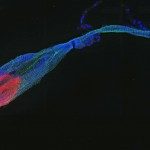Link to Pubmed [PMID] – 24755844
PLoS ONE 2014;9(4):e95868
In the past decade, malaria control has been successfully implemented in Cambodia, leading to a substantial decrease in reported cases. Wide-spread use of malaria rapid diagnostic tests (RDTs) has revealed a large burden of malaria-negative fever cases, for which no clinical management guidelines exist at peripheral level health facilities. As a first step towards developing such guidelines, a 3-year cross-sectional prospective observational study was designed to investigate the causes of acute malaria-negative febrile illness in Cambodia. From January 2008 to December 2010, 1193 febrile patients and 282 non-febrile individuals were recruited from three health centers in eastern and western Cambodia. Malaria RDTs and routine clinical examination were performed on site by health center staff. Venous samples and nasopharyngeal throat swabs were collected and analysed by molecular diagnostic tests. Blood cultures and blood smears were also taken from all febrile individuals. Molecular testing was applied for malaria parasites, Leptospira, Rickettsia, O. tsutsugamushi, Dengue- and Influenza virus. At least one pathogen was identified in 73.3% (874/1193) of febrile patient samples. Most frequent pathogens detected were P. vivax (33.4%), P. falciparum (26.5%), pathogenic Leptospira (9.4%), Influenza viruses (8.9%), Dengue viruses (6.3%), O. tsutsugamushi (3.9%), Rickettsia (0.2%), and P. knowlesi (0.1%). In the control group, a potential pathogen was identified in 40.4%, most commonly malaria parasites and Leptospira. Clinic-based diagnosis of malaria RDT-negative cases was poorly predictive for pathogen and appropriate treatment. Additional investigations are needed to understand their impact on clinical disease and epidemiology, and the possible role of therapies such as doxycycline, since many of these pathogens were seen in non-febrile subjects.

